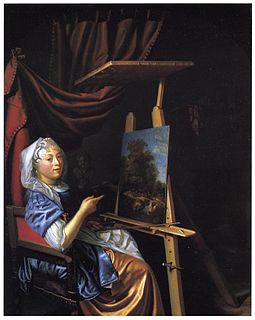
Carel de Moor was a Dutch Golden Age etcher and painter. He was a pupil of Gerard Dou.

Nicolaes Pieterszoon Berchem was a highly esteemed and prolific Dutch Golden Age painter of pastoral landscapes, populated with mythological or biblical figures, but also of a number of allegories and genre pieces.

Joris van Schooten (1587–1651) was a Dutch Golden Age painter and the uncle of the Leiden mathematician Frans van Schooten.

Pieter Cornelisz van Slingelandt was a Dutch Golden Age portrait painter who had been a pupil of Gerard Dou and is known as one of Leiden's fijnschilders..
Jacobus Bisschop was an 18th-century painter from the Northern Netherlands.

Abraham Diepraam, or Diepraem, was a Dutch Golden Age painter.

Pieter van der Willigen (1634–1694) was a Flemish Baroque painter.

Ernst Stuven was a German Baroque flower painter.

Franz Wulfhagen (c.1624–1670) was a German Baroque painter and engraver.
Willem van Drielenburg, was a Dutch Golden Age painter.

Wilhelmus Beurs (1656–1700) was a Dutch Golden Age painter.

Herman, or Harmen Hals, was a Dutch Golden Age painter.

Nicolaes Hals, was a Dutch Golden Age painter.

Philip Tideman (1657–1705) was a Dutch Golden Age painter.
Anthony Vreem, was a 17th-century Dutch painter.

Joost van Geel, was a Dutch Golden Age genre painter in the style of Gabriel Metsu.

Peeter Gijsels, was a Flemish Baroque painter.

Maria Schalcken (1645–1699), was a Dutch Golden Age painter. She was a sister and pupil of Godfried Schalcken.


















